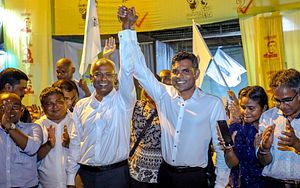On Sunday, voters in the Maldives granted a decisive victory to the opposition coalition’s candidate, Ibrahim “Ibu” Mohamed Solih, and offered a strong rebuke to incumbent President Abdulla Yameen. Yameen conceded defeat on Monday, after the release of official vote tallies.
Preliminary counts had put Solih with a multiple-point lead over Yameen, demonstrating a decisive victory for the opposition, which analysts had predicted if the election had taken place in a fair and free manner.
Turnout was particularly high. According to the Maldives Election Commission, turnout in the election reached a 89.22 percent, greatly assisting the opposition in its bid to take on the entrenched incumbency.
Solih gained a reported 58.3 percent of the vote. The presidential transition is not scheduled until November 17.
“This is a moment of happiness, this is a moment of hope, this is a moment of history,” Solih said, speaking at a news conference late Sunday night after preliminary results became clear. “I would like to call upon Yameen and ask him to respect the will of the people and to immediately begin the smooth transition of power as per the Constitution and the law.”
Already, the result is being interpreted through geopolitical lens. Reporting on the election result, the New York Times noted that “the isolated scattering of islands caught in a geopolitical struggle between China, India and the West … were thrust into more uncertainty Sunday.”
In recent years, Yameen positioned the Maldives strongly with China and rebuked India, which spoke out against his anti-democratic efforts and crackdown on the opposition.
Solih, the country’s de facto president-elect, is widely seen as supportive of India, which has historically been a major influence in Malé. Yameen, in the meantime, approached Beijing enthusiastically, taking on exorbitant debt to finance large infrastructure projects under the aegis of Chinese President Xi Jinping’s signature Belt and Road Initiative.
The result recalls Sri Lanka’s similar surprise presidential election outcome in January 2015, when pro-China strongman Mahinda Rajapaksa was ousted by Maithripala Sirisena, who favored a more balanced foreign policy approach for the Indian Ocean island state.
Neither India nor China formally released statements on the outcome of the election until Monday morning, though Sunday’s proceedings were being watched closely in both New Delhi and Beijing.
The Indian Ministry of External Affairs released a statement on Monday morning welcoming “the successful completion of the third Presidential election process in the Maldives which, according to preliminary information, Mr. Ibrahim Mohamed Solih has won.”
The U.S. State Department released a statement, almost contemporaneously with India.
“The United States congratulates the people of Maldives, who peacefully raised their democratic voices to determine the future of their country,” the statement noted. “Although the Election Commission has not yet announced the final tally, we note Maldives’ media and NGO reports that the Joint Opposition candidate has secured a victory following a peaceful day of polling.”
Mohamed Nasheed, the Maldives’ first democratically elected president, who was imprisoned by Yameen in 2015 and now lives in exile, congratulated Solih in a tweet. “You have done an extremely good service to not only to the people of Maldives, but also to freedom loving people everywhere,” Nasheed said.
The U.S. statement added a call for “calm and respect for the will of the people as the election process concludes.” The unusual decision to release this statement prior to the release of official results may suggest early concern in the U.S. that Yameen may have looked to push back. External support for the preliminary results, verified by watchdog groups, gave ballast to Solih’s victory.
China had not officially commented on the outcome as of Monday evening, local time.

































